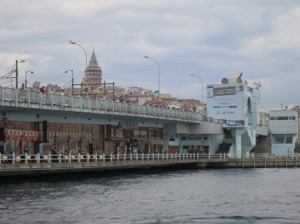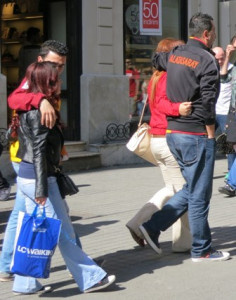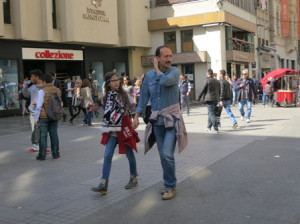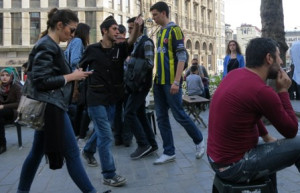“I hate Galatasaray. They are the worst team in the world,” Orhan remarks at his Camper shoe store on Istiklal Caddesi. A pedestrian walks past the shop wearing a Fenerbache shirt; he calls out to indicate their shared allegiance and she replies with a smile. Despite Orhan’s antagonism and smiling contempt for Galatasary, this is a day of unity between the fans of Istanbul’s three biggest teams. They are gathering to protest against a new system which requires personal information when buying tickets for football matches. A necessary means for maintaining security, the police will say, an incursion on the rights of citizens, fans and others will say. But, already, there is much tension between civilians and authorities; protests have been dispersed through violence; civilians have been killed. Tension is building.
It’s a Sunday morning on the Istiklal Caddesi. The street is already filled with shoppers, strollers, tourists, locals, buskers, activists, cleaners, workers. The street, formerly known as Grande Rue de Pera, and translated in English as Independence Avenue is in Istanbul’s district of Beyoglu, on the European side of the city. This is a plush walking, shopping street with many side streets, alleys and passagi (arcades) coming off it. The street is also home to the consulates of Sweden, Russia and The Netherlands. There are fine cafes in the side-streets, the well-stocked and carefully selected record store Lale Plak and also Salt (Beyoglu) – a three level contemporary art gallery. Istiklal may well be one way of measuring the moods of Istanbul.
Later in the day, I’m in the Adidas store on Istiklal and I’m looking for a Besiktas shirt. I’ve decided to adopt the team of a friend who lives in Leiden who I met through the running club. Besiktas are one of the big three clubs of Istanbul and are famous for their hardcore supporters known as Carsi (pronounced, roughly, Charshi). Throughout the city, one occasionally sees their tag: with the A written to indicate their anarchist ideology. Back at my hotel, Cesar – who sits at the front desk – says, “carsi her seye karsi” – which he translates as meaning “Carsi are against everything”. This is their own slogan and the group is known for their involvement in the protests against Erdogan of 2013 – in which members hijacked a bulldozer and chased the police. Although Cesar supports Galatasaray, he states his respect for Besiktas. He has less respect for Fenerbache which is embroiled in a match fixing scandal, but is on the brink of winning this years Turkish Super League championship.
Countless walks are no doubt needed to get to grip with Istiklal Caddesi’s intricacies, its moods and its rhythms. Sometimes pedestrians briefly jog as if in a hurry; teenagers laugh as they grasp their smart phones as if they are needed to maintain their balance. Some stop at the small stalls for simit or for sweets. Crowds gather to listen to the ensembles of buskers: some are playing varieties of traditional music, others are playing jazz, there are duos of guitars, too. In this city in which the craft of music is so respected and where musicians are revered, these acts of busking sound more like auditions for access to some of the nearby clubs and bars. These are necessary acts of spreading the word, being heard by possibly the right person. And thus, the buskers perform with their concentrated expressions; serious and proud of the music they’re delivering. The pedestrians who become their audience listen in respectful silence: applauding at the ends’ of songs. The crowds for these buskers swell and sometimes force pedestrians to almost walk in front of the occasionally passing antique trams that sometimes trundle slowly along Istiklal Caddesi.
Still at the Adidas shop, I get talking a little with the young assistant. His name is Cesar, and, as it turns out, he is a Fenerbache fan. I’m looking at the shirts of Besiktas and Fenerbahce which range from 75 to 115 Turkish lira. Since Fazil, back at the hotel, informed me of how Fenerbache robbed his team – Trabzonspor of the 2010-11 season championship, I’ve been reluctant to buy a Fenerbache souvenir. Nonetheless, their shirts are blue and yellow and I find the black and white of Galatasaray’s home shirt to be too similar to Collingwood of the Australian Football League – one of my home team’s main rivals. I ask Cesar of Fenerbache’s match fixing accusations after he tells me that it has been a difficult season and that Besiktas has been respectful of Fenerbache throughout the ongoing controversy and Trabzonspor’s application to UEFA to have the 2010-11 overturned. Cesar is ambivalent: he can’t deny the proof held against his team. He simply tells me that all of the clubs are doing it. It’s only a matter of degree.
Walking over from the Sultanahmet district shows offers a brief glimpse into some of the city’s moods and attributes. It is on this side of the Bosphorous that many of the so-called tourist attractions can be found: the Haghia Sophia (AD537), the Blue Mosque (AD 1616), the Topkapi Palace Museum, the Grand Bazaar, the Spice Market, Armenian churches, Roman ruins – the list is seemingly endless for those who wish to see everything that is redolent of the city’s various transformations. In between the Haghia Sophia and Blue Mosque, cruises are offered for the Bosphorous – prices are in Euros, the boat is leaving immediately and yes, my friend, a special price just for you. The guides jump between languages, English mainly, but many others too: Spanish, German, French, Italian, Russian. Tour groups, with their leaders proudly holding their flags or umbrellas erect to indicate their position, stride boldly towards the front of queues – their prioritised entrance already organised and paid for. It’s a mode of walking that ignores one’s surroundings.
And so I buy my Besiktas shirt – opting for their all black away shirt. It aint pretty, but, it speaks of a place. It’s a shirt that suggests something of a crossover between sporting and political culture. At least it makes a lie of the argument that ‘sport and politics shouldn’t be mixed’. The Besiktas shirt is one of many that in one way another is also suggestive of a rough set of beliefs and values. And thus, their supporters often wear them as markers of identity: not only to indicate their team, but, also to indicate their ideology. Their shirt quietly does their shouting for them. I’m talking with Cesar again and he indicates his disdain for Fenerbache: ah, their supporters are pale imitations of those of Besiktas. They copy whatever the Carsi do. Our conversation then turns to a point of mutual familiarity – the Australian soccer players to have played with Galatasaray – Harry Kewell and Lucas Neill. Kewell is remembered fondly, while Neill is remembered for being a mercenary. Despite his solid 2006 World Cup, Neill has fallen from affection with the generally forgiving fans of the Socceroos. We lament that a good defender has become known for his taste for cash rather than his goal stopping efforts.
Galata Bridge connects Eminonu with Karakoy and along this bridge is another network of communities of workers, fishermen and itinerant sellers. On the lower sections of the bridge are a string of fish restaurants, ranging from the simple to the luxurious: “Sembol Balik”, “Galata Balik” and others, all seeming similar and indistinguishable to the new and ignorant visitor who can largely only rely on the recommendations of guidebooks, or if lucky, a trusted friend or family member. But, otherwise, the passing tourist – temporary visitor with a limited investment? – is susceptible to the persuasions of the charismatic and assertive men who greet them and invite them just to take a look at the menu. The promoters of these restaurants affect their joking friendliness; the passing tourists attempt to politely reject their overtures, others are more forthright and show their annoyance. The promoters too speak their annoyance in Turkish as soon as the potential customer has departed one step further from their territory.
Fenerbache’s fate as champions of 2010-2011 is yet to be decided by FIFA and UEFA. No matter: champions to some cheats to others. “My team, my club, my identity: loyal I remain.” Corruption is a part of football just as politics is just as the ball is round. The protest that took place on the commercial and historical Istiklal Caddesi against the ticket purchasing procedures were disbanded in a heavy handed manner: protesters hid in the doorways. The tensions between fans and police are some of the few tensions within a context in which protests are becoming louder, bolder. The leftists along Istiklal are strident leading up to May Day and have already had one of their protests quashed for having encroached upon Taksim Square. Football is one means of getting to know the city and also offers an insight into the range of cultural, social, political conflicts currently unfolding. Football slowly opens up one of the many trajectories of Istanbul; a city made up of stories, swaying allegiances and thwarted or realised dreams, as much as it is of monuments, mosques, cathedrals and the remains of a Roman, Byzantanian past.



